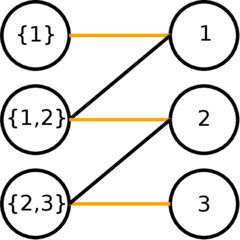TU Wien:Diskrete Mathematik für Informatik UE (Gittenberger)/Übungen WS13/Beispiel 34
Given a set with elements and . Prove that there exists an injective mapping such that for all if and only if for all the cardinality of is at least equal to the cardinality of .
Solution[Bearbeiten | Quelltext bearbeiten]
We construct a bipartite graph by placing a node for every set on the left side. Then we place a node for every element of on the right side. We connect a node for a certain set with every node which contains an element of with an undirected edge. To get an injective mapping we need to select a complete matching. This is the same task as in the marriage theorem. The elements of the set represent the men, while represents the set that woman is willing to marry. So to get to a complete matching all unions of the form must be greater or equal to the number of sets in the union .
Comment: This has to be proven here, doesn't it? Selfanswering (for other people): No, it hasn't. The iff-part in the description of this exercise refers exactly to the marriage theorem, so this is correct.
To make things clearer we give a small example where we can construct an injective mapping:
The Figure below shows the injective mapping for this example.

Siehe: https://math.stackexchange.com/questions/1506816/reformulating-a-problem-as-graph-theoretic-problem